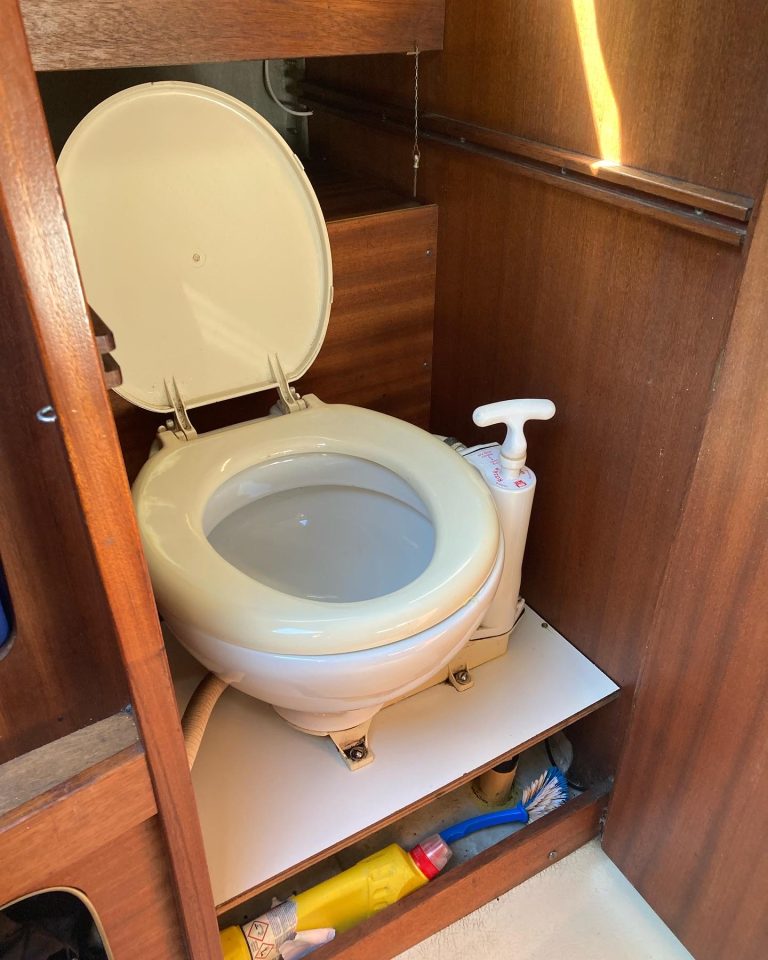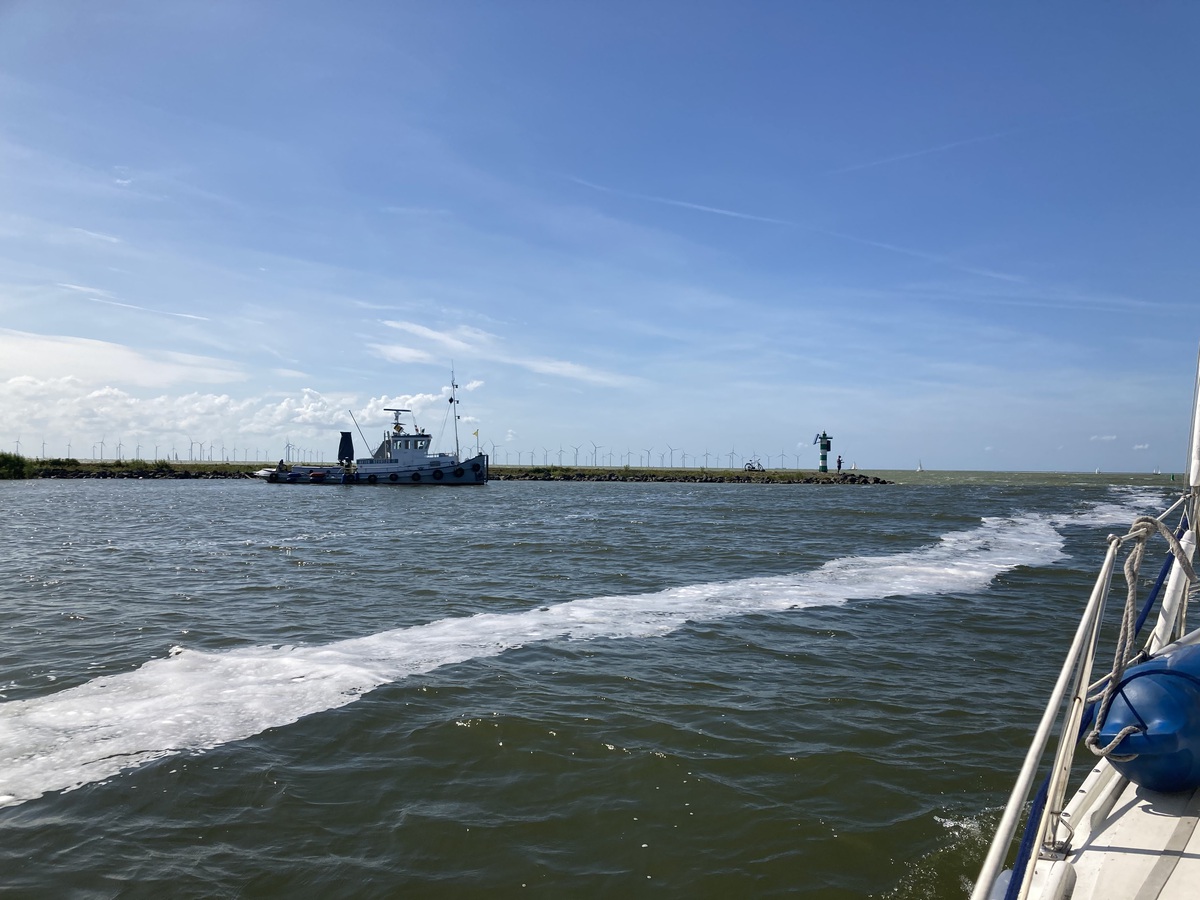Boat owners dump massive amounts of faeces in the water, polluting the water. Former TU Delft student Lucas Veel is working on a solution: a purification system for boats.
Boat owners dump feaces into the sea on a regular basis. (Photo: Jos Wassink)
“If you sail across the Frisian lakes during the Sneekweek sailing event, you will see faeces floating on the surface,” says Jules van Lier, former thesis supervisor of Lucas Veel. As Professor of Wastewater Purification at the Faculty of Civil Engineering and Geosciences and a fanatical sailor, Van Lier knows what he is talking about.
A lot of owners of small boats empty their stool in the water. “They have a wastewater tank, but many people either do not use it or empty the tank into the water. If you do watersports, it means that you are relieving yourself in your own backyard. And people swim in it.”
Unhygienic. And apart from that, emptying the wastewater tank has been prohibited since 2009. If you do so, you may be fined. As an alternative the Government has worked with harbours to build places called pump stations where boat owners can empty their tanks. There are now about 400 pumping stations in the Netherlands.
Diseases
Yet, huge numbers of boat owners still empty their tanks into the water, says TU Delft alumnus Lucas Veel. The former student of Environmental Engineering (CEG) dedicated his thesis to the problem of wastewater dumping and is now working on the issue with Fluss, his start-up. He is planning to launch a disinfection system on the market so that the biggest problems caused by dumping are a thing of the past.
The pumping stations are not the best solution. The state of the pumping stations is one of the reasons, says Veel. “About 70% of the pumping stations are broken, do not have any staff to help with emptying, or are situated inconveniently,” he says. “There are marinas where only one boat owner empties their tank on a given day, while there are lots of boats sailing around. So you can just guess what happens with the rest of the wastewater.”
You can get really sick from swallowing the bacteria in faeces
So dumping is not only dirty, it also has bad effects, explains Van Lier. “The process of breaking down the faeces also removes the oxygen from the water. This kills insects and fish and can cause a whole ecosystem to collapse.” Swimming in that polluted water is not advisable as faeces contains a lot of pathogens. You can get really sick from swallowing the bacteria in faeces. Swimmer Maarten van der Weijden even had to stop his attempt at setting a new record because of this.


It is a big problem. The quality of the surface water in the Netherlands is one of the worst in Europe. Only a tiny proportion of the large rivers and lakes in the Netherlands currently meet the European quality standards. This is partly because, being a river delta, the Netherlands is the drain of Europe. Pollution from countries that are closer to the river source, such as Switzerland and Germany, ends up in the Netherlands. The waste from the 160,000 small boats in the Netherlands adds to this.
The poor water quality will have a crippling effect, believes Van Lier. “It could have similar effects as the current nitrogen crisis. If Europe enforces standards, strict rules on water pollution may be passed and polluting activities may have to stop.”
Alternative
So there is a very strong need for an alternative to dumping. One of the options is to purify the wastewater. If pathogens are rendered harmless, it will put an end to getting sick from swallowing surface water, which under Dutch law is the biggest problem. The Dutch Government has permitted purification through certified systems since 2019. There is one problem though – a system does not yet exist.
At least not for small boats, explains Veel. “Boats above 30 metres often have a purification system on board. They have the space. Purification units can be three metres long and involve various connected purification steps. These will never fit on small boats where every decimetre counts.”
Fluss
It was Gert Nützel, fanatical watersports enthusiast who lived on a big yacht, that made Veel think about the purification issue. He no longer wanted to dump the wastewater from the yacht and wanted a solution. One challenge to be overcome was to find a laboratory space as Nützel did not have one. So he approached TU Delft and Van Lier, looking for help.
Veel accepted the challenge. “You normally do your master’s research under the supervision of a PhD student. In the research with Gert I did not have that help and had to find out everything myself. This was a challenge, but it meant that I could move in any direction I thought fit. I had a lot of freedom to do research into a functional small-scale purification methodology.”
‘This technology even makes the dirty water too clean’
Veel spent a good part of one year in the lab, where he tested the purification of the wastewater in two steps. “The wastewater is a brown sludge,” he says. “The first step was to remove the solid substances. What then remains is a firm disc, a sort of hockey puck. It is easy and compact to store.”
The remaining liquid is clear and yellowish. “It’s a kind of urine really, only it still contains substances from the faeces and, of course, the pathogens,” says Veel. Before this stream can be discharged into the surface water, it first needs to be disinfected. They used UV disinfection in the lab, radiating it with UV light. This killed the pathogens in the stream, rendering it harmless.
The test showed that Veel’s system worked. “We even discovered that this technique makes the wastewater too clean,” says Veel. “We ended up well below the concentration of bacteria ceiling permitted by law. This means that we can use an even easier method for purification.”
Patent
What step will then be scrapped? “Research in Friesland showed that the effect of water sports on the level of nutrients in the water is negligible,” says Veel. “It’s mostly about the amount of pathogens that end up in the water, and this is what legislation on purifying this water mostly covers.”
The nutrients are mostly derived from the solid components of faeces. Veel decided not to remove them from the wastewater anymore. This makes the system more compact and economical, he says. “It just makes it harder to kill all the bacteria in the water as the UV light does not penetrate all the way through solid substances. Luckily we found a way to do this, but I cannot say any more because of the patent application.”
Things are progressing. Veel has graduated and set up the Fluss company with Gert Nützel at the beginning of 2022. They are working on further developing the compact purification system.
The pair are looking forward to a rosy future. Fluss received an innovation loan from the Rabobank worth EUR 150,000, employed a new staff member last June, and will start working on a market pilot this year. “We will produce a few prototypes that we will try to sell and install. Hopefully we can then scale up.”
Obligatory
The legislation is working for them too. All boat owners will be required to seal drainage pipes, thereby making dumping difficult. This rule had been delayed because of objections from people involved in water sports, but the first steps will be taken this year. If things go according to plan, the law will take effect in 2027 and will be enforced.
Should countries such as Belgium, Germany and France get the same purification standards as the Netherlands, the market will be a lot bigger, anticipates Veel. “The USA already has legislation, so that too is an interesting market. And in Turkey, with its very clear blue water and checks using drones, the chance of getting caught dumping is very high.”
Still, there are some caveats. Before the market pilot is done and there is a definitive system on the market, Fluss will be over one year down the line, says Veel. “There may be other systems on the market by then. But I don’t mind competition. It gives us the chance to prove that we have the best system.”
- Are you interested in a project, student internship or collaboration with Fluss? Then email lucas_veel@hotmail.com.
Do you have a question or comment about this article?
K.S.vanderWal@tudelft.nl


Comments are closed.